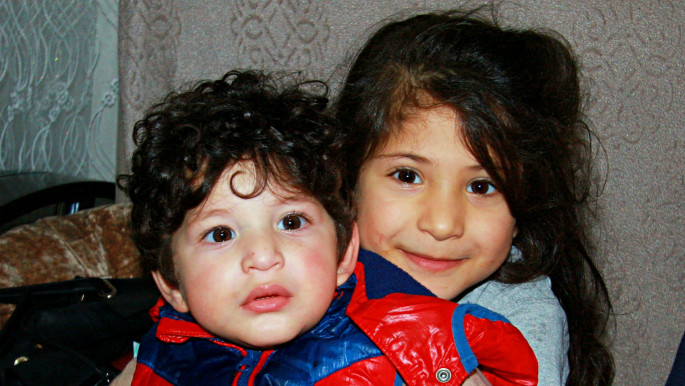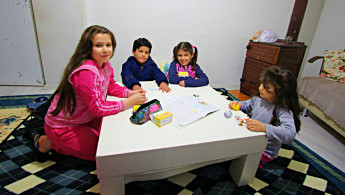Can Syrians find a new home in Turkey, or just temporary refuge?
Eleven-year-old Hude is Syrian. Fortunately, she no longer lives in the unsafe, bombed-out hell that is her home city of Aleppo. Instead, she lives in the coastal city of Trabzon, on the shore of the Black Sea, in Turkey.
Hude arrived as a refugee in Trabzon with her family three years ago. She now thinks of the city as her home. She speaks Turkish fluently and, she tells me, this has helped her make many new friends. In fact, she says, her younger years in Syria feel as though they were from a different life.
But she hasn't forgotten the heat - and she hasn't forgotten the bombs.
"I remember being afraid when I heard the bombs," she says. "I didn't know who was dropping them, I just knew the people doing it were bad. We had money so we had a nice house but we had to move to the other side of the province where it was safer.
"Some of my relatives are still in Syria. Sometimes we talk on the phone. They are not good, they need to move a lot and they are very worried about the situation."
Hude, pronounced hoo-day, fled Syria with her parents Merve and Yusuf, nine-year-old brother Omer, and sister Tesnim, aged seven. Today, that panicked escape seems distant, as Hude, who wears a pink-and-red top emblazoned with the words "Happy girls" across the front, chatters away with confidence and a big smile.
She is bright - able to slip between Arabic and almost-perfect Turkish with ease as she flicks her long brown hair over her shoulders. She says she likes to play games with friends when she is not at school, and tells me her dream is to be a teacher when she grows up.
 |
|
| Omer and his sister Hude [Charlie Faulkner] |
Other relatives live in Hude's building, and she often spends time with her younger cousins. Despite the trauma through which some of them have lived, the group play and giggle on the living room floor as though their lives have always felt as secure as they do in this moment.
It is a sign of their resilience, a quality Hude and her family have had to have in spades, for, despite escaping the war, there have been worse horrors and hardships to endure.
 |
When it happened, my father had just finished praying - so he was clean and ready for the angels. It's kind of good that he left in that way. He'll be in heaven now |  |
Soon after arriving in Turkey, Hude's father was killed in a fire. He was just 31. The fire left her brother Omer with severe burns across his face, neck, arms and chest. His scars remain plain to see.
Widowed and aged just 28, Hude's mother now faces the daily battle of bringing up three children as a single parent, in a foreign country, unable to speak the language. Her only alternative is to return to Syria.
"The accident happened at home," Hude says. "So now the house is often cold because my mother is worried about the stove. When it happened, my father had just finished praying - so he was clean and ready for the angels. It's kind of good that he left in that way. He'll be in heaven now."
Hude's 25-year-old aunt, Meryem, also lives in her building. She is wearing a striking, baby-blue dress that fits as though it was tailored for her slender figure. It zips up at the front, has matching detailing on the shoulders and a blue belt made from the same material fastened around her small waist. A light blue, satin headscarf covers her hair and frames her young face.
Meryem says she lived a comfortable life in Syria but was forced to flee her home five years ago. She arrived in Turkey with her husband Usame and daughter Elmas after losing everything, two years earlier than Hude's family. She is able to speak a little Turkish, but relies heavily on her niece to translate.
"[President Bashar] al-Assad's soldiers killed my brother. We lost my father for a while but he returned out of the blue. My house was bombed, my car was bombed," Meryem explains through tears. "The final straw was when I couldn't find anything to feed my daughter.
"My gold earrings were the last thing I had left of any value so I sold them to buy food and then we said 'that's it, that's enough', and we fled the country."
Meryem and her family first arrived in Gaziantep, a city in southern Turkey not far from the Syrian border. They lived there for just two and half months because, Meryem says, they were made to feel unwelcome.
 |
|
| Elmas with brother Yusuf [Charlie Faulkner] |
"The atmosphere was not nice there," she says. "The rental market is very expensive because of the high number of refugees in the area and there is a lot of anti-refugee people who made it clear they didn't want us there."
Meryem says her brother-in-law had already travelled up to Trabzon and suggested they move there too.
"He told us it was a better option, that the people were much nicer," she says. "So, we moved here and then I had my son."
Although Meryem's husband, Usame, has been able to find marble-cutting work, it is unreliable. And following the death of Hude's father, he is under even greater pressure to provide, now with two families to support. Although they receive some financial help from the Turkish government and Red Crescent - around 600tl ($150) per month for each family - life is clearly a struggle.
 |
Here, I cry every day. I'm constantly worried about my parents. I miss my old life and I want to go back to it |  |
The two mothers cry as they talk about their experiences. They say they feel isolated. When asked how they survive, an emotional Meryem simply says: "Allah."
She wipes away her tears. "Before war, Syria was beautiful. Everything was cheap, we had delicious food, everything was amazing. We had money, I had a house twice the size of my home here, I had a car. I was happy.
"Here, I cry every day. I'm constantly worried about my parents. I miss my old life and I want to go back to it."
Before our interview, neither family had contact with local charities, did not know how to enrol in Turkish language school and were unaware of additional financial support they were entitled to from the Turkish government.
Turkey has provided refuge for around 3.5 million Syrians since the start of the war, offering them free healthcare, education and support to find work. However, tensions among Turkish people towards the refugees is rising as resources and infrastructure are pushed to their limits.
On Thursday February 8, Turkish president Recep Tayyip Erdoğan said Turkey "aims to ensure 3.5 million Syrian" refugees "return to their homes", Hurriyet Daily News reported. Addressing local provincial leaders at the presidential palace in Ankara, he said pursuing Operation Olive Branch - Turkey's month-long offensive in Syria's northwestern Kurdish-held Afrin province - was key to achieving that goal.
"We want our refugee brothers and sisters to return to their land, to their homes," said Erdoğan. "We are not in the position to hide 3.5 million here forever."
 |
||
| Elmas, Tesnim and Hude [Charlie Faulkner] |
The government has stopped registering Syrian refugees in Istanbul in response to the swelling numbers in the city, it announced last week.
Meanwhile, some 86.2 percent of Turks believe "Syrians should be sent back to their country once the war in Syria has ended". The figure was published on Monday February 5, following a survey conducted by the Istanbul Bilgi University Center for Migration Research in partnership with the German Marshall Fund (GMF).
A report by the International Crisis Group (ICG), published at the end of January, warned tensions in major cities Izmir, Istanbul and Ankara are on the rise, with aggressive and violent behaviour towards Syrians under-documented. The report states violence between communities and Syrian refugees increased threefold in the second half of 2017 compared with the same period in 2016.
Meanwhile, the city of Gaziantep has borne the brunt of the refugee influx, with Syrians now accounting for around 25 percent of its two million population. This may provide some explanation to the hostility Meryem and her family felt there from local Turkish communities.
In a recent interview, Gaziantep's Mayor Fatma Şahin told Hürriyet: "When there had been speedy arrivals [of Syrians], there had been an increase in the demand for housing. As the demand exceeded the supply, rents went up, water shortages started."
What does Meryem think the future holds for her family?
"For us, it's either Syria or Turkey - that's enough for us, nowhere else.
"We don't want to go to any other countries because Islam is not welcome, particularly the hijab. The children are happy here, they have friends, the people are friendly here, we don't want to leave.
"But, of course, if we can return to Syria, we will. I just don't know if that will ever be possible."
Charlie Faulkner is a British journalist based in Istanbul whose work focuses on migration and women's rights.
Follow her on Twitter: @Charlie_Faulk



